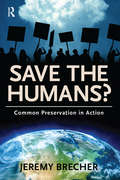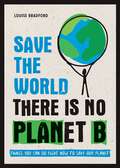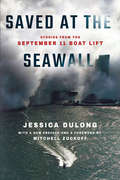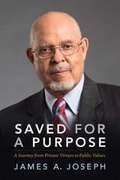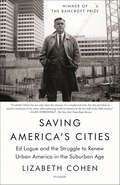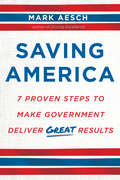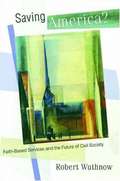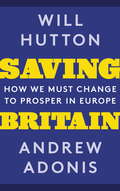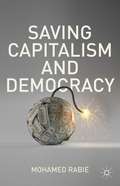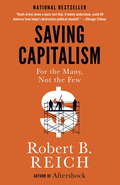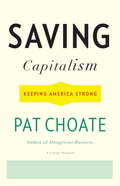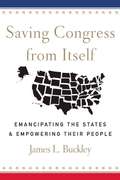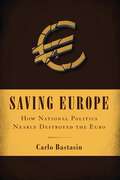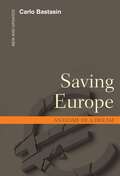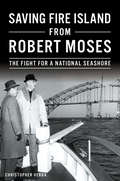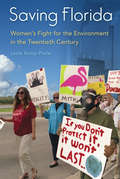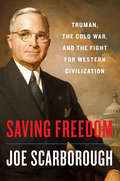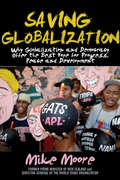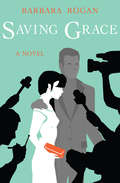- Table View
- List View
Save Our Land, Save Our Towns: A Plan For Pennsylvania
by Thomas Hylton Blair SeitzPulitzer Prize-winning jounalist Thomas Hylton outlines in a readable style with Seitz's award-winning photography a plan for Pennsylvania - or any state - to preserve farmland and forests, and revive our cities and neighborhoods - as well as lower our cost of living. Winner of National Trust for Historic Preservation award.
Save the Humans?
by Jeremy BrecherSave the Humans? argues that individual self-interest depends on common preservation - cooperation to provide for mutual well-being. As world leaders fail to cooperate to address climate change, nuclear proliferation, economic meltdown and other threats to our survival, increasing numbers of people experience a pervasive sense of denial and despair. But Jeremy Brecher has seen common preservation in action, and in Save the Humans? he shows how it works. From Gandhi's civil disobedience campaigns in India, to the 2011 uprisings throughout the Middle East, Brecher shows what we can learn from past social movements to help us confront today's global threats.
Save the World: There is No Planet B: Things You Can Do Right Now to Save Our Planet
by Louise BradfordTogether, we can change the worldThere is little doubt that our beautiful planet is now under huge threat; our weather is more extreme, plastic litters our oceans, industrial production and farming methods wreak havoc on the environment and mass deforestation has led to the extinction of many species. Carry on this way and it’s almost certain that sea levels will continue to rise, there will be extreme heatwaves, loss of the polar ice caps and mass pollution; in short, a very worrying future for us all. We need to take action before it’s too late, and we can all do our bit to help. This guide is full of simple tips we can all incorporate into our daily lives, and will demonstrate how small eco-friendly changes can have a huge positive effect on the world around us. They might even save the planet.
Save the World: There is No Planet B: Things You Can Do Right Now to Save Our Planet
by Louise BradfordTogether, we can change the worldThere is little doubt that our beautiful planet is now under huge threat; our weather is more extreme, plastic litters our oceans, industrial production and farming methods wreak havoc on the environment and mass deforestation has led to the extinction of many species. Carry on this way and it’s almost certain that sea levels will continue to rise, there will be extreme heatwaves, loss of the polar ice caps and mass pollution; in short, a very worrying future for us all. We need to take action before it’s too late, and we can all do our bit to help. This guide is full of simple tips we can all incorporate into our daily lives, and will demonstrate how small eco-friendly changes can have a huge positive effect on the world around us. They might even save the planet.
Saved at the Seawall: Stories from the September 11 Boat Lift
by Jessica DuLongSaved at the Seawall is the definitive history of the largest ever waterborne evacuation. Jessica DuLong reveals the dramatic story of how the New York Harbor maritime community heroically delivered stranded commuters, residents, and visitors out of harm's way. Even before the US Coast Guard called for "all available boats," tugs, ferries, dinner boats, and other vessels had sped to the rescue from points all across New York Harbor. In less than nine hours, captains and crews transported nearly half a million people from Manhattan.Anchored in eyewitness accounts and written by a mariner who served at Ground Zero, Saved at the Seawall weaves together the personal stories of people rescued that day with those of the mariners who saved them. DuLong describes the inner workings of New York Harbor and reveals the collaborative power of its close-knit community. Her chronicle of those crucial hours, when hundreds of thousands of lives were at risk, highlights how resourcefulness and basic human goodness triumphed over turmoil on one of America's darkest days.
Saved for a Purpose: A Journey from Private Virtues to Public Values
by James A. JosephThe son of a minister, James A. Joseph grew up in Louisiana's Cajun country, where his parents taught him the value of education and the importance of serving others. These lessons inspired him to follow a career path that came to include working in senior executive or advisory positions for four U. S. Presidents and with the legendary Nelson Mandela to build a new democracy in South Africa. Saved for a Purpose is Joseph's ethical autobiography, in which he shares his moral philosophy and his insights on leadership. In an engaging and personal style, Joseph shows how his commitment to applying moral and ethical principles to large groups and institutions played out in his work in the civil rights movement in Alabama and as a college chaplain in California in the turbulent 1960s. His time later as vice president of the Cummins Engine Company provided an opportunity to promote corporate ethics, and his tenure as Under Secretary of the Interior in the Carter Administration underscored the difficulty and weight of making the right decisions while balancing good policy analysis with transcendent moral principles. In 1996 President Clinton selected Joseph to become the United States Ambassador to South Africa. His recollections of working with Nelson Mandela, whom he describes as a noble and practical politician, and his observations about what he learned from Desmond Tutu and others about reconciliation contain some of the book's most poignant passages.Saved for a Purpose is unique, as Joseph combines his insights from working to integrate values into America's public and private sectors with his long engagement with ethics as an academic discipline and as a practical guide for social behavior. Ultimately, it reflects Joseph's passionate search for values that go beyond the personal to include the ethical imperatives that should be applied to the communal.
Saving America's Cities: Ed Logue and the Struggle to Renew Urban America in the Suburban Age
by Lizabeth CohenWinner of the Bancroft PrizeIn twenty-first-century America, some cities are flourishing and others are struggling, but they all must contend with deteriorating infrastructure, economic inequality, and unaffordable housing. Cities have limited tools to address these problems, and many must rely on the private market to support the public good.It wasn’t always this way. For almost three decades after World War II, even as national policies promoted suburban sprawl, the federal government underwrote renewal efforts for cities that had suffered during the Great Depression and the war and were now bleeding residents into the suburbs. In Saving America’s Cities, the prizewinning historian Lizabeth Cohen follows the career of Edward J. Logue, whose shifting approach to the urban crisis tracked the changing balance between government-funded public programs and private interests that would culminate in the neoliberal rush to privatize efforts to solve entrenched social problems. A Yale-trained lawyer, rival of Robert Moses, and sometime critic of Jane Jacobs, Logue saw renewing cities as an extension of the liberal New Deal. He worked to revive a declining New Haven, became the architect of the “New Boston” of the 1960s, and, later, led New York State’s Urban Development Corporation, which built entire new towns, including Roosevelt Island in New York City.Logue’s era of urban renewal has a complicated legacy: Neighborhoods were demolished and residents dislocated, but there were also genuine successes and progressive goals. Saving America’s Cities is a dramatic story of heartbreak and destruction but also of human idealism and resourcefulness, opening up possibilities for our own time.
Saving America: 7 Proven Steps to Make Government Deliver Great Results
by Mark AeschNational polling indicates that, for the first time in American history, people believe their children will not be as well off as they are. Even more alarming, is that many Americans believe the biggest problem facing our nation today is government itself. The public sector receives trillions of taxpayer dollars every year, and yet because of its inability to operate effectively, government fails to deliver the quality of service we are paying for. It is clear the American people are weary of paying Ritz Carlton-level taxes for Bates Motel-quality government. In Saving America, Mark Aesch tells us where government--at the local, state, and federal level--is falling short and offers a coherent, non-partisan, seven-step plan for rebuilding our nation's public agencies. The book is not a political broadside nor is it theoretical; instead, it's an inspirational and instructional framework that will help citizens, elected officials, and public administrators make American government great--and provide taxpayers with real value. The 7 Steps to Success will lead to measurable gains for organizations large and small, including school systems, municipal governments, entire states, and even the federal government itself, producing real results for taxpayers and consumers.
Saving America: Faith-Based Services and the Future of Civil Society
by Robert WuthnowThe author discusses whether congregations are effective vehicles for providing broad-based social programs and whether they are actually fostering the civil society.
Saving Britain: How We Must Change to Prosper in Europe
by Will Hutton Andrew AdonisBritain's Brexit voters are right. They have been shamefully neglected. But the answer is to change Britain, not to leave Europe. This book sets out how we can radically improve the lives of people and communities shut out from prosperity.The EU, despite its frailties and strains, is a success story.The advantages of leaving are illusory: no gains in trade from deals with protectionist China and the United States can compensate for what is being lost in Europe. Britain is weakening a pillar of the world's diplomatic and trade order at the same time as weakening itself - an act of self-harm, especially when so many countries are retreating from democracy, free trade and progressive values.In Saving Britain Will Hutton and Andrew Adonis set out a bold plan to transform Britain and fight for Europe as a force for good at home and abroad.
Saving Britain: How We Must Change to Prosper in Europe
by Will Hutton Andrew AdonisBritain's Brexit voters are right. They have been shamefully neglected. But the answer is to change Britain, not to leave Europe. This book sets out how we can radically improve the lives of people and communities shut out from prosperity.The EU, despite its frailties and strains, is a success story.The advantages of leaving are illusory: no gains in trade from deals with protectionist China and the United States can compensate for what is being lost in Europe. Britain is weakening a pillar of the world's diplomatic and trade order at the same time as weakening itself - an act of self-harm, especially when so many countries are retreating from democracy, free trade and progressive values.In Saving Britain Will Hutton and Andrew Adonis set out a bold plan to transform Britain and fight for Europe as a force for good at home and abroad.
Saving Capitalism and Democracy
by Mohamed RabieSaving Capitalism and Democracy tries to answer the difficult questions posed by intellectuals, the media, politicians, students and ordinary people concerning the crisis and how to avert an impending catastrophe.
Saving Capitalism from the Capitalists: Unleashing the Power of Financial Markets to Create Wealth and Spread Opportunity
by Raghuram G. Rajan Luigi ZingalesAnalysis of our Economy during the past century.
Saving Capitalism: For The Many, Not The Few
by Robert B. ReichFrom the author of Aftershock and The Work of Nations, his most important book to date--a myth-shattering breakdown of how the economic system that helped make America so strong is now failing us, and what it will take to fix it. Perhaps no one is better acquainted with the intersection of economics and politics than Robert B. Reich, and now he reveals how power and influence have created a new American oligarchy, a shrinking middle class, and the greatest income inequality and wealth disparity in eighty years. He makes clear how centrally problematic our veneration of the "free market" is, and how it has masked the power of moneyed interests to tilt the market to their benefit. Reich exposes the falsehoods that have been bolstered by the corruption of our democracy by huge corporations and the revolving door between Washington and Wall Street: that all workers are paid what they're "worth," that a higher minimum wage equals fewer jobs, and that corporations must serve shareholders before employees. He shows that the critical choices ahead are not about the size of government but about who government is for: that we must choose not between a free market and "big" government but between a market organized for broadly based prosperity and one designed to deliver the most gains to the top. Ever the pragmatist, ever the optimist, Reich sees hope for reversing our slide toward inequality and diminished opportunity when we shore up the countervailing power of everyone else. Passionate yet practical, sweeping yet exactingly argued, Saving Capitalism is a revelatory indictment of our economic status quo and an empowering call to civic action.From the Hardcover edition.
Saving Capitalism: Keeping America Strong
by Pat ChoateWhen the U.S. financial structure collapsed in fall 2008, it quickly became clear that our system of market capitalism was broken, endangered by decades of absolutist market dogma, shortsighted policies, and the abandonment of America's working people. Now, as the Obama administration seeks to repair the country's economy, one thing is clear: this crisis calls for drastic reforms. Regrettably, the government's response, so far, has been inadequate.In Saving Capitalism, economist and bestselling author Pat Choate offers six game-changing actions that can strengthen the U.S. economy now and stimulate long-term, self-sustaining, noninflationary economic growth that will create millions of better jobs. Here are proposals for:• Major tax reform• All-encompassing financial regulation• A strong social safety net• A major infrastructure program• Ways and means to balance U.S. trade with the rest of the world• The renewal of national innovationUrgent and provocative, Saving Capitalism is an accessible and informative dissection of the gravest threat our economy has faced since the Great Depression, and a bold and creative blueprint for the future.
Saving Congress from Itself
by James L BuckleySaving Congress from Itself proposes a single reform: eliminate all federal grants-in-aid to state and local governments. This action would reduce federal spending by over $600 billion a year and have a profound effect on how we govern ourselves. The proliferation of federal grants-in-aid programs is of recent vintage: only about 100 such grants existed before Lyndon Johnson took office, and now they number more than 1,100. Eliminating grants to the states will result in enormous savings in federal and state administrative costs; free states to set their own priorities; and improve the design and implementation of programs now subsidized by Washington by eliminating federal regulations that attend the grants. In short, it will free states and their subdivisions to resume full responsibility for all activities that fall within their competence, such as education, welfare, and highway construction and maintenance. And because members of Congress spend major portions of their time creating grants and allocating funds assigned to them (think earmarks), eliminating grants will enable Congress to devote its time to responsibilities that are uniquely national in character.
Saving Europe
by Carlo BastasinThree times in the few years since the global financial crisis erupted, the euro has come close to extinction, endangering both the world economy and history's most ambitious project in shared sovereignty. Yet each time, the case for a common currency proved to be more compelling than its weaknesses, and the euro survived. Saving Europe reveals how the nexus of international economics and national politics pushed monetary union to the brink of a breakup, how that disastrous development was avoided, and why the long-term viability of a common currency challenges politics as we know it.Carlo Bastasin reveals and analyzes what has been happening behind the scenes in European negotiations since the financial crisis began with the collapse of major financial institutions in 2008. He argues that the crisis in the euro zone actually has a political origin, having emerged from the self-interested abuses of national politics. Moreover, the crisis is reinforced even now by the obstinate defense of national prerogatives in politics and finance as well as by the lack of commitment for shared or supranational sovereignty. While the prevalent view is that monetary union was a flawed project from the start and is in need of amending, Bastasin shows that the failures have to do almost entirely with national opportunism-not only in Greece but in most countries, including Germany-and concludes that the crisis will lead to Europe's political union.Bastasin's work is an engrossing historical chronicle, interweaving moments of high drama with individual personalities on the world stage. German ChancellorAngela Merkel, French President Nicolas Sarkozy, and national and European central bankers, among others, play key roles. Saving Europe is also a rigorous attempt to make larger sense of what has happened in the euro zone and what might happen next. Given the central importance of Europe within the fragile world economy as well as growing speculation that the euro might disappear, this is essential reading for anyone trying to grasp international economics and politics. Just as important, it is a compelling tale of people, personalities, power, and money. There is no other book like it.
Saving Europe
by Carlo BastasinIn this gripping narrative, Carlo Bastasin reconstructs the main political decisions of the euro crisis, unveiling the hidden interests and the secret diplomacy behind the scene. The European dream was both the rejection of war and the creation of a new spirit of peaceful cooperation. Yet confrontation has been the hallmark of the euro crisis, and national opportunistic gimmicks have driven the awkward attempts to solve the crisis itself. Today, Europe is in a crisis of democracy, which Bastasin has dubbed, "the first War of Interdependence of the global age." Praise for the first edition of Saving Europe Bastasin does an admirable job in analysing the euro-zone's economic challenges and is a sure-footed guide through the seemingly endless European Union summit meetings that were supposed to resolve them. He also has an eye for the human detail that makes his sad account of institutional muddle surprisingly compelling. - Financial TimesBastasin's book is worth reading for its detailed political narrative of the eurozone crisis to date, focusing on the interaction among decision-makers in Europe's capitals. - Foreign AffairsA reconstruction that may be considered definitive. Revelations on the European negotiations are written with talent and go hand in hand with no-esoteric economic analysis and with the right amount of realism to reach the political substance. -Corriere della SeraAnyone looking for general knowledge and deeper understanding of the crisis, I can recommend a formidable analysis by Carlo Bastasin: Saving Europe. The author is a very unusual combination of a qualified economist and driven journalism. -Svenska Dagbladet
Saving Fire Island from Robert Moses: The Fight for a National Seashore
by Christopher C. VergaSmall coastal communities stand up to the giant of mid-20th century urban development in this chronicle of a true David and Goliath drama. With its unspoiled, tranquil shorelines, Fire Island has been an oasis for vacationers for well over a century. But from the late 1930s into the early 1960s, it was an obsession for Robert Moses, the political power broker and "master builder" who reshaped much of New York. His urban development projects helped create Long Island&’s suburbs, and he dreamed of turning Fire Island into an extension of Ocean Parkway. Standing up to those ambitions were the seventeen individualistic communities of Fire Island, unified in their love for their sun-washed sandy beaches. To maintain a traditional way of life with limited access to motor vehicles, the community began the fight for federal protection through the creation of the Fire Island National Seashore.
Saving Five: A Memoir of Hope
by Amanda Nguyen'Amanda's story underscores the lasting power of speaking your truth, building a movement, and never losing sight of your dreams' Melinda French GatesA brave and imaginative memoir by the Nobel Peace Prize nominee Amanda Nguyen, detailing her healing journey and ground-breaking activism in the aftermath of her rape at Harvard.At a Harvard fraternity party in 2013, the trajectory of Amanda Nguyen's life was changed forever when she was raped.The American-born child of Vietnamese refugees, Nguyen had long dreamed of attending Harvard, and it had become a place of refuge from a childhood filled with turmoil and trauma. Determined to not let her rape derail the life she'd worked so hard to create, she opted for her rape kit to be filed under Jane Doe, knowing that an active court case tied to her name could hurt her odds of working for NASA after graduation, a goal she'd been working toward for years.But she was shocked to learn this choice meant she had only six months to take action before the state of Massachusetts destroyed her kit, rendering any future legal action impossible. Nguyen knew then that she had two options: surrender to a law that effectively silenced survivors of sexual assault, or fight for a change.A deeply affecting memoir of grief, survival, and hope, Saving Five details Nguyen's winding journey of recovery and action, which ultimately led her to create the Sexual Assault Survivors' Bill of Rights, one of the only unanimously passed laws in the history of the United States. Both a tribute to resilience and a lesson on healing, Saving Five is an inspirational story for the ages.
Saving Five: A Memoir of Hope
by Amanda Nguyen'Amanda's story underscores the lasting power of speaking your truth, building a movement, and never losing sight of your dreams' Melinda French GatesA brave and imaginative memoir by the Nobel Peace Prize nominee Amanda Nguyen, detailing her healing journey and ground-breaking activism in the aftermath of her rape at Harvard.At a Harvard fraternity party in 2013, the trajectory of Amanda Nguyen's life was changed forever when she was raped.The American-born child of Vietnamese refugees, Nguyen had long dreamed of attending Harvard, and it had become a place of refuge from a childhood filled with turmoil and trauma. Determined to not let her rape derail the life she'd worked so hard to create, she opted for her rape kit to be filed under Jane Doe, knowing that an active court case tied to her name could hurt her odds of working for NASA after graduation, a goal she'd been working toward for years.But she was shocked to learn this choice meant she had only six months to take action before the state of Massachusetts destroyed her kit, rendering any future legal action impossible. Nguyen knew then that she had two options: surrender to a law that effectively silenced survivors of sexual assault, or fight for a change.A deeply affecting memoir of grief, survival, and hope, Saving Five details Nguyen's winding journey of recovery and action, which ultimately led her to create the Sexual Assault Survivors' Bill of Rights, one of the only unanimously passed laws in the history of the United States. Both a tribute to resilience and a lesson on healing, Saving Five is an inspirational story for the ages.
Saving Florida: Women's Fight for the Environment in the Twentieth Century
by Leslie Kemp PooleIn Saving Florida, Leslie Kemp Poole casts new light on the women at the forefront of Florida’s environmental movement. From creating parks to protesting air pollution, fighting dredge-and-fill operations, and exposing the health dangers of pesticides, these women caused unprecedented changes in how the Sunshine State values its many and marvelous natural resources.At the beginning of the twentieth century women didn’t have the vote, but by the end of the century they were founding issue-specific groups, like Friends of the Everglades, and running state and federal agencies, including the U.S. Environmental Protection Agency. They set the foundation for the next century’s environmental agenda, which came to include the idea of sustainable development, which meshes ecology and economy to enhance energy efficiency and the function of natural systems.This is an indispensable history that not only underscores the importance of women in the environmental movement but also shows how as a collective force they forever altered how others saw women’s roles in society.
Saving Freedom: Truman, the Cold War, and the Fight for Western Civilization
by Joe ScarboroughNEW YORK TIMES BESTSELLER!History called on Harry Truman to unite the Western world against Soviet communism, but first he had to rally Republicans and Democrats behind America’s most dramatic foreign policy shift since George Washington delivered his farewell address. How did one of the least prepared presidents to walk into the Oval Office become one of its most successful?The year was 1947. The Soviet Union had moved from being America’s uneasy ally in the Second World War to its most feared enemy. With Joseph Stalin’s ambitions pushing westward, Turkey was pressured from the east while communist revolutionaries overran Greece. The British Empire was battered from its war with Hitler and suddenly teetering on the brink of financial ruin. Only America could afford to defend freedom in the West, and the effort was spearheaded by a president who hadn’t even been elected to that office. But Truman would wage a domestic political battle that carried with it the highest of stakes, inspiring friends and foes alike to join in his crusade to defend democracy across the globe.In Saving Freedom, Joe Scarborough recounts the historic forces that moved Truman toward his country’s long twilight struggle against Soviet communism, and how this untested president acted decisively to build a lasting coalition that would influence America’s foreign policy for generations to come. On March 12, 1947, Truman delivered an address before a joint session of Congress announcing a policy of containment that would soon become known as the Truman Doctrine. That doctrine pledged that the United States would “support free peoples who are resisting attempted subjugation by armed minorities or by outside pressures.” The untested president’s policy was a radical shift from 150 years of isolationism, but it would prove to be the pivotal moment that guaranteed Western Europe’s freedom, the American Century’s rise, and the eventual collapse of the Soviet Union. Truman’s triumph over the personal and political struggles that confronted him following his ascension to the presidency is an inspiring tale of American leadership, fierce determination, bipartisan unity, and courage in the face of the rising Soviet threat. Saving Freedom explores one of the most pivotal moments of the twentieth century, a turning point when patriotic Americans of both political parties worked together to defeat tyranny.
Saving Globalization
by Mike MooreGlobalization is not new, nor is it a policy, it's a process that has existed as long as man looked over the horizon, travelled and traded. It can't be stopped but it can be slowed. It came to a grinding halt in August 1914 and the Marxist detour cost millions of lives and lost three generations their opportunity and hope in many countries. More wealth has been created in the past 60 years than in all of history. After the most successful decade of sustained economic growth in history, this progress is threatened. Extreme inequality, corruption and environmental degradation threaten the stability and legitimacy of many developing countries' regimes. Anti-globalization and anti-capitalist campaigners' confidence has been emboldened due to the present economic crisis. Protectionist rhetoric is growing as are the arguments to control and regulate markets. Leaders are meeting to discuss how to face these problems and create a new international architecture. How did we get to this position? What should we do? What is it that determines why some contemporary states are successful while others have failed? Saving Globalization departs from its analysis of the globalised economy in the twenty-first century to answer these question by tracing the development of what Moore considers to be 'the big ideas of history': democracy, independent courts, the separation of church and state, property rights, independent courts, a professional civil service, and civil society. Democratic capitalism has worked for most people. Why? It is a remarkable story, from the Greeks to the Geeks, encompassing technological progress and the corrections and contradictions between liberty and equality, technology, growth and the environment. In defence of the many virtues and opportunities that globalisation offers, Mike Moore makes the case for a fresh and new approach to our international Institutions and for domestic policies that promote equity and fairness. The book controversially attacks the new enemies of reason and evidence. The threats now come from all sides, especially workers in developed countries who fear for their jobs. Mike Moore is a political practitioner turned theoretician.
Saving Grace
by Barbara RoganA young woman in New York is caught between her politician father and a manipulative lover in a novel that offers &“sheer enjoyment&” (Library Journal). Jonathan Fleishman has always been perceived as the rarest kind of politician: as idealistic as he was powerful, genuinely committed to the good of the people. For Jonathan, public approbation is the oxygen he breathes; so it is deeply galling that the one person who refuses to see his worth is his own beloved daughter, Grace. When his spotless record is challenged by accusations of corruption leveled by Gracie&’s lover, a ruthless young journalist named Barnaby, Jonathan&’s good life is abruptly shattered. And Grace, faced with the betrayal of a lover who used her to get at her father, comes to realize that neither man is what he seems, even to himself. Saving Grace is an intricately textured book, a portrayal of a family in crisis and an exploration of the intersection between public and private lives. Library Journal called Saving Grace the book that &“Bonfire of the Vanities tried to be.&”

